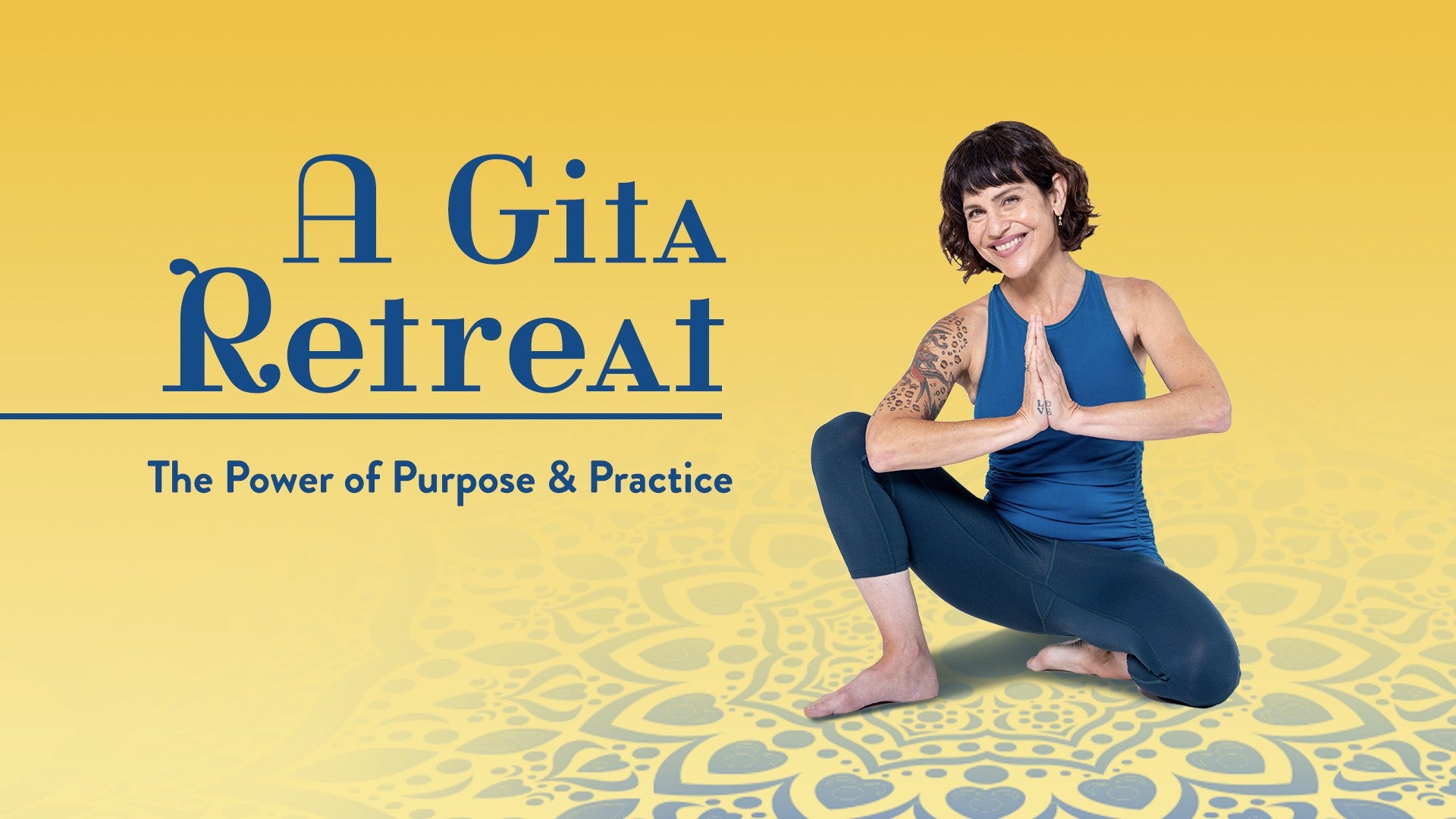Description
About This Video
Transcript
Read Full Transcript
I was raised in a spiritual family, and so the Bhagavad Gita and Eastern traditions were very present, and so I'd always heard of the Bhagavad Gita, and of course seen pictures of Krishna and Arjuna, always the charioteer, and it meant very little to me, but I'd seen it around, and then when I started to practice yoga for myself, the same thing, I would see and hear of the Bhagavad Gita, but I was never moved to pick it up, I don't know why, but it wasn't that deep yet, and I was so insecure about myself and what I'd even be able to pick up on it. But it wasn't until I went into Dharmamitra's class in this OG yoga studio back in the 1900s and late 80s, I want to say, or early 90s, on 23rd Street, funky carpeted little plays, and Dharmamitra is just if some of you haven't heard of him or had his teachings, he's Brazilian, and kind of speaks in a little, very softly, and so I found refuge there, I didn't know what I was doing, I was still living in, I certainly wasn't on a spiritual path or considered myself a yogi by any means, I was still drinking and doing a lot of drugs and living not the most healthy lifestyle, but a friend had taken me knowing my dance background, and I was just like, okay, this is acrobatics, but there was something that drew me, and I did feel peace, and I did feel like it was a refuge, so I kept going, I didn't understand a word he said, because I'm also hard of hearing, and I have been for a long time, but I would go to the classes, and then I would leave, go back to my life, and then one day I'd gone to an evening class, and afterwards they held what was called a satsang, again, at the time these terms were so foreign to me, I really, you know, I was just there to kind of, for the exercise or the movement, and so he said, why don't you stay, we're having chai, and that's very familiar to me, because I was, I'd grown up in the Middle East and traveled to the East when I was very young, and I said okay, and then he started to read from the Bhagavad Gita, and all I would pick up is that he would say, and then the Lord says, speaking with a very strong Portuguese accent at the time, and I didn't pick up a word, but I felt something deep, because it was his devotion to it that was so beautiful, and I felt this instant connection really from the way that he was connecting to it, and his students were kind of laughing and nodding along, I couldn't quite hear him, and also I was in the back, I was always the back of the room kind of person so I could make my exit, but I stayed, because I did feel something deep in my heart, and it just kept saying, and then the Lord said, and then the Lord said, so it was something that was being transmitted, and from then on, I mean, not that I went and I grabbed a copy of the Bhagavad Gita, but it just wasn't as intimidating. I think the first time I actually picked up a copy, I was working, I did start to move in a more, progressively in a more healthy direction, and so I was working at integral yoga in New York City, and on 13th Street, there's a big store, there's the studio, the yoga center, and then there's a huge health food store, and they had a restaurant in there, and so I was just more familiar with the teachings, and I would go take class, and saw Satchitananda's commentary, which is called The Living Gita, and that's a full-on commentary, so it's like the Sanskrit verse, which I just never understood, and it was a lot, when I would pick it up and read it, and like, this doesn't really sink in, but then the commentary started to really express what was really going on, and I was just like, oh, and then even seeing that it was a conversation, because I would just kind of breathe through the first parts, but then I started to get a little bit more interested, and started to explore the text a little bit more on my own when I was working there, I would leaf through it, because there were just piles of the books on the side, and then there was a, I think it's in his introduction, or it's in the back of the book, that he says, you don't have to read the whole Gita, pick one sloka, pick one phrase, and that can be enough, you'll understand the whole thing, but it was also like, pick one, and then see if you can live it, see if it can fully be integrated into your life for it to really even matter, because it says that it's not a heady text, it's actually meant for simple-minded people like myself, because I'm not an academic, and I remember trying to learn all of it, I read all the Vedas and tried really hard to be academic, and a lot of it I could understand, because the philosophies are somewhat familiar to me, but I just always wanted, of course, something I couldn't have, which was to be this very heady, academic, philosophy-type person, but this spoke to the heart, and that it's a poem, and it's a conversation, and I was just like, okay, this I get. When I speak about the Bhagavad Gita as my bestie, my BFF, or my best friend, it really is, you know, through this lens of how we can receive the teachings, what's most profound, and Krishna does say, you know, that you can find me through intimate connections, through intimate relationships, not in the ethers, so you can find me, you know, I can come to you as a mother, as a father, as a child, as a lover, in nature, however it is you seek me, you will find me whichever way that you do, and I remember another text that I read on the Bhagavad Gita, I think it's the one by Eknath Eshwaran that I reference a lot, and he, in his book, said that Gandhi referred to the Bhagavad Gita as his mother, and I was like, well, I don't really see the Gita necessarily as my mother, but definitely as a best friend. Some of the qualities that are so rich is this honesty, right, where the way that it's written, first of all, is so friendly, it's so personal, it is a relationship between two friends, and for me, the qualities of a friend, again, I have had some of my best friends now I've had for a long time, and they've seen me change over the years, they've been with me through my darkest, darkest, darkest days, and they've also, you know, been there for my life's greatest pleasures, you know, births and big celebrations, new things that happen into my life, but they've been there through it all, and the same thing for me, I hold friendship so important in my life as this support, and for me, real connection, that it's not through the way that I like to show up and the way my friends show up for me, especially recently, I've gone, I went through one, you know, it's always one of the most challenging times, like I know many of us have, but it was my friends that showed up, let's say no matter how much I was praying to a god up in the sky, or sometimes we pray for healing, but it's how we show up, and so the teachings of the Gita, no matter when it is that I open up, they meet me where I am, they honestly meet me how I am, the message is so, it's so personal, so again, just to compare it a little bit with, let's just say, my other favorite spiritual text, which is the Yoga Sutras of Patanjali, it doesn't have quite that vibe, it's not personal, it's not really friendly, it's just this is the way that it is, kind of a traditional text that you study, and of course memorize and chant in the same way, but it's not this conversational and impassioned and really filled with feeling, and I think it's just been through my relationship to it that my practice became a way of making friends with myself, because again, I had a very punitive practice, I thought, you know, it was always to make myself better, or to just show up and torture myself, or I'm going to turn into a better person, but my practice now, and especially through the Gita, just accepted me as I am, day to day, so to have a text like this that's, you know, and teachings that are just reminders, and if you pick them up, it doesn't say you're, you know, if you do this, you're a horrible person, it's got such a big world view that accepts every part of human nature, and it's actually a love song to our humanity taking place on this battlefield, which again can be a metaphor for what we experience inside, and then again, just the encouraging words of Krishna continuing to say rise up, rise up, you don't understand, I'll explain it this way, you still don't understand, how about this, you still don't understand, you know, patience and understanding, and a good dose of tough love too. For someone that's brand new to the Gita, my first suggestion would be don't get caught up in some of the languaging from what I've experienced, and especially a lot of gender non-conforming folks and women, because it's so he, he, he and him oriented, and some of the language of turn everything over to me, live your life in devotion to me, give everything up for me. Some of this language can be so much from the religions and cultures that we came from, that we're adverse to, that had us try to find a spiritual path, and so when this is so saturated with that same type of language, there can be some turn off, even in teacher trainings when I do use the Bhagavad Gita as one of our main texts, and so many people have just said it's so hard for me, but thank you so much for unpacking it for me a little bit, because they would let me know that it was just so hard for them to get over the languaging and get to the heart of what the teachings are. So that's first, if you're brand new, and then secondly is to just, because it's meant to be the song of God, again just getting to know what the meaning of the Bhagavad Gita is, the song of God, that it's, to remember it's a poem and something that's being sung to you, rather than something you have to, you know, that you're, again, I just think of many religions of just having this punitive tone, that it is nurturing, it's meant to be nourishing to your soul, and that you can just kind of flip through it. This is how even in India, my teacher would read anything from any text, or start the day, we'll just skim through it, open it up, and put your finger, you know, like this, put your finger on it, and let that really speak to you, right, and if it doesn't, keep going, but keep going until you find something, one word that calls on you. I started with one verse, and so whenever I would teach a class, I would sound like I was very smart, and I knew the entire Gita backwards in Sanskrit, but I knew one single verse, and I would teach over and over and over again, until it really served me in that moment, and then there was another one that served me in a different moment, that kind of came into focus, because at first it's just like this big blur of words, and it's long, and there's different chapters, but then at different times of our lives to really see it as this relationship, a message will come to us, that when the student is ready, the teacher appears, so that would be my, you know, to kind of have fun with it, let's just say if you're, like, more like a tarot deck, like, oh, I wonder what the universe has in store for me today, and then turn the page, see if something pops out to you, and then try to sit with it for a little bit and see how it may show up through your day. Journaling for me is like a powerful practice to just say, like, oh, okay, this could be the message, if that's part of your spiritual practice. You don't have to be a Hindu to study from the Gita. What's really beautiful about these teachings is that they are so universal. Of course, the Bhagavad Gita comes from even a larger Hindu spiritual text called the Mahabharata, just a little portion that was extracted for yoga practices. So yoga in itself, you know, is meant to be universal. It's meant to be more of the spiritual sect rather than a religious sect. And in the teachings, it just is just brought out so plainly, you know, whoever it is that comes and serves me with a loving heart, I will come to them. There's no strict even saying you have to do this, that, and the other thing, you know, is just live your life with devotion, show up in your life, and I'm here for you. Again, some of the concepts may be a little bit challenging to sit with, one of them being reincarnation. A lot of Westerners don't believe in reincarnation. This one is really saturated with that concept. So again, we have to honor yoga's roots and where it comes from. And so reading sacred spiritual texts, you know, and honoring and understanding that yes, it does come from Hinduism, but you do not have to be a Hindu in order to understand it. Because once again, it's just such a, especially this particular text is so steeped in humanity, rather than bigger concepts. You know, there's things again, it will be more natural for a Hindu to be able to read it and grasp it and understand it, even who Krishna is, an avatar or an essence of God, or an essence of God, or an essence of God. That may be something that could, you know, have it just be more difficult to grasp. But again, to be able to digest its meaning and its heart, anyone can pick up.
So I think Dharma is a very complicated idea for us to grasp as Westerners. Because we weren't born into a cast, although we were born into families that perhaps, you know, you're born into this family of doctors, you're going to be a doctor. But we, you know, we do have choices. And so it's difficult to find, what is my purpose? Who am I? In the Bhagavad Gita, it's really laid out pretty clearly, that your Dharma is based on who you come into the world as, that it doesn't change. And it's very much hinges on a particular combination of the Gunas. And our Gunas, or who we are, like, what we're born, or this, you know, particular qualities that make us who we are, is again, it says in the Bhagavad Gita, dependent on our past actions, or our past life. So if we want the Gita's description of, why was I born into this body, and into this life, and doing what I'm doing, it's all hinges, it's, it all hinges on this past experience. And the sum of our experiences is cause and effect, right? So we're here to work out our Karmas, or our actions from a past life. So whether or not, do you believe that I like to believe that, I love that concept, because my mind wants to grasp on like, this is, this is where it comes from. Okay, that makes sense. So who we are in our purpose, yes, it may seem like it changes. It may seem like it changes. But on the spiritual path, it is to get to know who we are. For me, I'll just make it very personal. And for a lot of Yogis, it's been a journey of coming back to the self. So even in the Gita, something like yoga is the journey of the self to the self through the self. Lots of selves. But if we are born with particular qualities, and I mean, I have a kid, and if you see children, they all have different temperaments. It's meant to be our temperament is part of what role we're supposed to play in the world, right? So if we're a more nurturing type of person, if we're slower, if we have, you know, it's just terrible, because, you know, let's just say society doesn't encourage us to be that way if we're of a particular physical type, right? We're not honored in our differences. It's so much, especially in the Western world, to do this, you know, to be successful, and to go to college, and you're going to do this, and you're going to do that. And success is only a certain way. So we're fighting against ourself, I think, generally in the West, and against our nature to fit into a particular mold that is not who we are. Hopefully, by some crisis, generally, a big blow, it'll take us back. You know, I know even from the family I was born into, I mean, the embarrassing to me family I grew up into, we sat on the floor, we had pictures of Hindu deities on the wall. I didn't want anyone to come over, right? It was a very spiritual Eastern family mortified. So I did everything to get away from that. I went to move to New York, and got my hair and my nails, and my, you know, I wanted to be a certain way, and I just got sicker and sicker until life circumstances brought me back, kind of.
You're supposed to be in this type of tradition or role when we begin to listen, right? I do feel like for a long time, for most of us, we're playing a role that we're not deeply satisfied, right? So let's just say we get a job, we have all the things. Say we have a car, we get married a few times, we have kids, a few of them, we keep jumping from them. You know, we hear about these stories, like these incredible people that looks like they have everything the best life, and they are miserable on the inside. And a lot of it is, you know, the idea is that not in tune with who we truly are, no matter what it is it looks like on the outside that we have, until we give everything away, we renounce everything, and come back to this essence, a pure essence of who we are. And then how can we live in alignment with that person that we discover? The reason why this, why the Bhagavad Gita has been so poignant to me especially, and I'm so grateful to be able to share these teachings at this particular time, is that I feel like its teachings more than really so many of the other spiritual texts, I've had millions of the books in my house, are just down to earth, and to the point, and how they, and how it really calls on, using our lives as service. I think we feel so undervalued, many of us, a lot of us, due to our color, our race, our gender, our sexual orientations, that aren't even seen or acknowledged by society at all. And so this calling to rise up, be who you are, this courage to be able to be who you are, and through that we're using your life as service, right? That is the fight to be able to be who you are, and we're hearing so many more voices come out, and that's so wonderful. The other way that I think it's so poignant is this vision of complete equality, where Krishna says, you know, that I exist within the heart of every human. So if we can literally walk out the door and see everyone as God, or as a sacred being, the planet that needs us right now, I think we're so disconnected from the sacred, because we're inundated with so much, so many different crises, so many catastrophic, you know, mind-blowing and heart-wrenching things that are going on in the world. But, you know, but to be able to say that it's happened forever, this is nothing new, even that the Gita takes place on this horrific battlefield, and then the step-by-step process of how we can use our particular lives to be able to be of service and to create positive change in the world. You know, the constant mantra is live your life as service, serve every human being, you know, give as much of yourself over, and that could just be, you know, whatever opportunity is, but if we're stuck in our own egos and just constantly thinking about me, me, me, me, not thinking the universe is like where I want to be able to serve, we're only thinking about serving me. When I hopefully one day become confident in who I am and my unique purpose as I am, I am more able to go out into the world and say, how can I be of service? How can I be of service to you? How can I be of service in this situation? How do I know that I'm not going to be effective at all in that situation? Not at all. Somebody else can, but I'm needed and will be super effective over here in the way that I'm living. You know, so I feel like it can transform our lives, especially so many of us that, you know, that feel like we've lost so much, you know, to be able to come back to who we are and live in the world but not allow it to affect us so much so that we suffer as much as we do. You are amazing. Rise up. So the call to rise up, to rise up no matter where we've been, who we are, what we do, and then it's really who we are inside and what we're giving through really everything we do in the world that I really do feel we can, if we see, you know, there's some verses that are so beautiful, Krishna, you know, singing about how he exists within everything and the water and the trees and the mountains and the ocean, if we can, without thinking Krishna because we're not in Hindu, but that everything is so sacred, we may live a little differently instead of just everything's disposable. I don't care what happens to anything or anyone. I'm just going to keep living for myself because this is a book to turn that around, you know, and its practices and of how can I let go of my, you know, what keeps me so bound, you know, in my egoic and past patterns and my selfishness. For Arjuna, it's a big thing. It's even his life, right? And Krishna's like, who cares if you die? You're doing your purpose.
But that's not what I'm referring to, but it's just like to give our lives over, you know, in a way that's going to, you know, affect positive change, to be able to wake up to the ways that we can, especially I think for so much of the, you know, social justice work that's been done is to raise those voices and for us to be able to listen and see and hear and say, well, what can I do to be of help? What can I do to be of support? I've been so blinded. You know, Krishna keeps saying, I've been so blinded. I did not know, you know. But if we hear and we listen to everyone as if they are our bestie or like Krishna, then I feel like the teachings right now are just transformative.
A Gita Retreat: The Power of Purpose and Practice
Comments
You need to be a subscriber to post a comment.
Please Log In or Create an Account to start your free trial.















